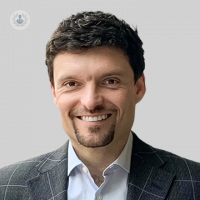All about reverse total shoulder arthroplasty
Written in association with:Reverse total shoulder arthroplasty (RTSA) has revolutionised the treatment of complex shoulder pathologies, particularly in patients with rotator cuff-deficient shoulders. Since its introduction in the 1980s, RTSA has offered a viable solution for patients who previously had limited surgical options and poor outcomes.
This innovative procedure has transformed the management of conditions such as rotator cuff tear arthropathy, severe osteoarthritis, and complex fractures, significantly improving pain relief, function, and quality of life for many patients. Here to provide more expert detail is revered consultant orthopaedic shoulder and elbow surgeon, Mr Paolo Consigliere.

The evolution and impact of RTSA
Traditional anatomic shoulder arthroplasty relies on the integrity of the rotator cuff to function effectively. However, many patients with severe shoulder pathologies suffer from irreparable rotator cuff tears, making conventional shoulder replacement less effective. The development of RTSA addressed this limitation by altering the biomechanics of the shoulder joint.
By reversing the ball-and-socket configuration, RTSA shifts the center of rotation medially and inferiorly, allowing the deltoid muscle to compensate for the deficient rotator cuff. This fundamental change in design has enabled patients with non-functional rotator cuffs to achieve stable and functional shoulders postoperatively.
Key advantages of RTSA
There are many benefits that RTSA offers. These include:
- Improved pain relief and function: RTSA has shown superior outcomes in pain relief and shoulder function compared to traditional shoulder arthroplasty in patients with rotator cuff tear arthropathy.
- Expanded indications: RTSA has expanded the surgical indications for shoulder arthroplasty to include patients with complex fractures, fracture sequelae with proximal humerus malunion, severe glenoid bone loss in joint osteoarthritis, instability arthropathy (wear and tear of the joint due to chronic shoulder joint instability), irreparable rotator cuff tear, and failed previous shoulder surgeries.
- Enhanced stability and reduced dislocation rates: The unique semi-constrained design of RTSA enhances joint stability, reducing the risk of dislocation, which is a common complication in traditional shoulder arthroplasty.
Challenges and future directions
Despite its success, RTSA is not without challenges. Complications such as scapular notching, prosthetic loosening, and acromial stress fractures have been reported. Ongoing research and advancements in prosthetic design, surgical techniques, and rehabilitation protocols aim to address these issues and further improve outcomes. The future of RTSA may involve the development of patient-specific implants and minimally invasive surgical approaches, enhancing both the safety and effectiveness of the procedure.
To book a consultation today with Mr Paolo Consigliere, just visit his Top Doctors profile today.


